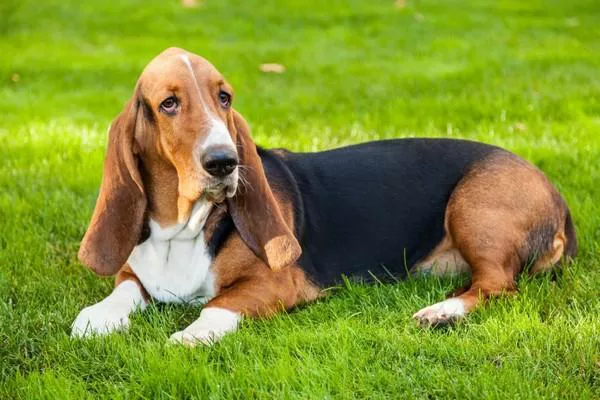Introduction:
Basset Hounds are beloved canine companions known for their droopy ears, soulful eyes, and laid-back demeanor. As responsible pet owners, it’s crucial to ensure that our four-legged friends receive a well-balanced diet to maintain their overall health and happiness. While commercial dog food provides essential nutrients, incorporating certain human foods into their diet can be a great way to add variety and provide additional nutritional benefits. In this article, we will explore a wide range of human foods that are safe and beneficial for Basset Hounds, while keeping their specific dietary needs in mind.
Understanding the Basset Hound‘s Nutritional Requirements: Before delving into the specific human foods suitable for Basset Hounds, it’s important to understand their unique nutritional requirements. Basset Hounds require a well-balanced diet that consists of proteins, carbohydrates, fats, vitamins, and minerals. Additionally, they have specific dietary needs due to their predisposition to certain health issues, including obesity, allergies, and joint problems. Therefore, any human food introduced into their diet should be done so with careful consideration and moderation.
Safe and Healthy Human Foods for Basset Hounds: 2.1 Lean Proteins: Protein is an essential component of a Basset Hound’s diet, promoting muscle development and supporting overall health. Lean proteins are a safe and healthy addition to their meals. Good sources of lean proteins include cooked chicken, turkey, lean beef, and fish such as salmon or tuna. It is important to remove any skin, bones, or seasoning before offering these proteins to your Basset Hound.
Fruits and Vegetables:
Fruits and vegetables offer a range of vitamins, minerals, and fiber that can benefit your Basset Hound’s overall health. However, it’s important to be cautious as some fruits and vegetables can be harmful to dogs. Safe options include apples (without seeds), blueberries, strawberries, watermelon (seedless), carrots, green beans, and sweet potatoes (cooked without seasoning). Remember to wash and prepare these foods appropriately, removing any seeds, pits, or skin that could pose a choking hazard or be toxic to dogs.
Whole Grains:
Whole grains can be a valuable addition to your Basset Hound’s diet, providing energy, fiber, and essential nutrients. Options such as cooked brown rice, quinoa, and oats (plain and cooked) can be included in moderate amounts. However, be mindful of gluten sensitivity or grain allergies that some Basset Hounds may have. Always introduce new grains gradually and monitor your dog’s response for any adverse reactions.
Dairy Products:
While some dogs may be lactose intolerant, others can tolerate dairy products in moderation. Low-fat options such as plain yogurt or cottage cheese can provide a source of calcium and protein. However, it is important to monitor your Basset Hound for any signs of gastrointestinal discomfort and consult your veterinarian if you suspect lactose intolerance.
Healthy Fats:
Incorporating healthy fats into your Basset Hound’s diet can support their skin and coat health, as well as provide essential fatty acids. Suitable options include small amounts of olive oil, coconut oil, and fish oil. These fats should be added sparingly, ensuring they do not contribute to excess calorie intake.
Foods to Avoid: While there are numerous human foods that can be safely incorporated into a Basset Hound’s diet, there are also several foods that should be avoided to prevent potential health issues. Some common foods that are toxic to dogs include chocolate, caffeine, grapes and raisins, onions, garlic, avocado, and alcohol. It is crucial to educate yourself on the full list of harmful foods and ingredients and take necessary precautions to prevent accidental ingestion by your Basset Hound.
Moderation and Portion Control: When introducing human foods to your Basset Hound’s diet, it is important to exercise moderation and portion control. While certain foods may be safe, excessive consumption can still lead to nutritional imbalances or weight gain. Treats or additions should not exceed 10% of your Basset Hound’s daily caloric intake. Consult with your veterinarian to determine the appropriate portion sizes and frequency for adding human foods to your Basset Hound’s diet.
Consulting with Your Veterinarian: Before making any significant changes to your Basset Hound’s diet or introducing new human foods, it is crucial to consult with your veterinarian. They can assess your dog’s specific health needs, provide tailored recommendations, and address any concerns you may have. Your veterinarian’s expertise will help ensure that any dietary modifications are appropriate for your Basset Hound’s overall health and well-being.
Conclusion:
Incorporating certain human foods into a Basset Hound’s diet can be a safe and nutritious way to add variety and enhance their overall well-being. However, it is essential to keep in mind their specific nutritional requirements, potential allergies or sensitivities, and exercise caution when introducing new foods. Moderation, portion control, and consultation with your veterinarian are key to providing a well-balanced diet that supports your Basset Hound’s health and happiness. By making informed choices and following the guidelines outlined in this article, you can provide your beloved Basset Hound with a diverse and nutritious diet that will contribute to their overall longevity and quality of life.


